 Public perceptions about pot have come a long way, from the dire warnings of "Reefer Madness" to growing acceptance of medical marijuana to the legalization of recreational weed use.
Public perceptions about pot have come a long way, from the dire warnings of "Reefer Madness" to growing acceptance of medical marijuana to the legalization of recreational weed use.  On July 27, the New York Times published "High Time: An Editorial Series on Marijuana Legalization," which called for the federal government to repeal its ban on marijuana.
On July 27, the New York Times published "High Time: An Editorial Series on Marijuana Legalization," which called for the federal government to repeal its ban on marijuana.  Matt Figi's 7-year-old daughter Charlotte was once severely ill. But a special strain of medical marijuana known as Charlotte's Web, which was named after the girl early in her treatment, has significantly reduced her seizures. On July 28, Rep. Scott Perry, R-Pennsylvania, introduced a three-page bill that would amend the Controlled Substances Act -- the federal law that criminalizes marijuana -- to exempt plants like Charlotte's Web that have an extremely low percentage of THC, the chemical that makes users high.
Matt Figi's 7-year-old daughter Charlotte was once severely ill. But a special strain of medical marijuana known as Charlotte's Web, which was named after the girl early in her treatment, has significantly reduced her seizures. On July 28, Rep. Scott Perry, R-Pennsylvania, introduced a three-page bill that would amend the Controlled Substances Act -- the federal law that criminalizes marijuana -- to exempt plants like Charlotte's Web that have an extremely low percentage of THC, the chemical that makes users high.  While politicians and supporters look on, New York Governor Andrew Cuomo signs a ceremonial bill to establish a medical marijuana program in New York, on July 7, 2014. New York is the 23rd U.S. state to authorize medical marijuana.
While politicians and supporters look on, New York Governor Andrew Cuomo signs a ceremonial bill to establish a medical marijuana program in New York, on July 7, 2014. New York is the 23rd U.S. state to authorize medical marijuana.  In April, Maryland became the 18th state to decriminalize marijuanapossession. Research published by the Pew Research Center inFebruary showed 54% of Americans support legalization of marijuana.
In April, Maryland became the 18th state to decriminalize marijuanapossession. Research published by the Pew Research Center inFebruary showed 54% of Americans support legalization of marijuana.  Sean Azzariti, an Iraq war veteran and marijuana activist, becomes the first person to legally purchase recreational marijuana in Colorado on January 1. Colorado was the first state in the nation to allow retail pot shops. "It's huge," Azzariti said. "It hasn't even sunk in how big this is yet."
Sean Azzariti, an Iraq war veteran and marijuana activist, becomes the first person to legally purchase recreational marijuana in Colorado on January 1. Colorado was the first state in the nation to allow retail pot shops. "It's huge," Azzariti said. "It hasn't even sunk in how big this is yet." 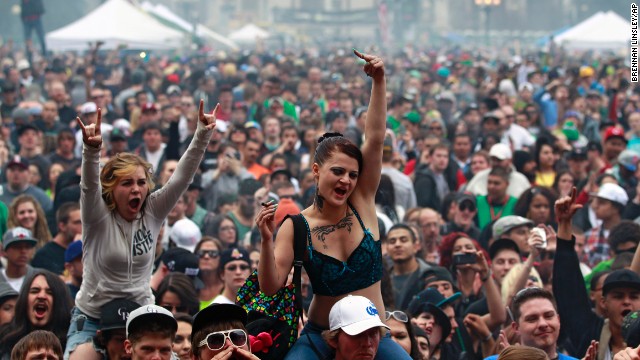 Members of a crowd numbering tens of thousands smoke and listen to live music at the Denver 420 Rally on April 20. Annual festivals celebrating marijuana are held around the world on April 20, a counterculture holiday.
Members of a crowd numbering tens of thousands smoke and listen to live music at the Denver 420 Rally on April 20. Annual festivals celebrating marijuana are held around the world on April 20, a counterculture holiday.  A man smokes a joint during the official opening night of Club 64, a marijuana social club in Denver, on New Year's Eve 2012. Voters in Colorado and Washington state passed referendums to legalize recreational marijuana on November 6, 2012.
A man smokes a joint during the official opening night of Club 64, a marijuana social club in Denver, on New Year's Eve 2012. Voters in Colorado and Washington state passed referendums to legalize recreational marijuana on November 6, 2012. 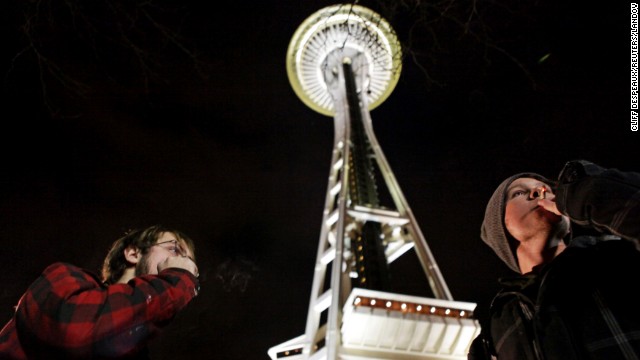 People light up near the Space Needle in Seattle after the law legalizing the recreational use of marijuana went into effect in Washington on December 6, 2012.
People light up near the Space Needle in Seattle after the law legalizing the recreational use of marijuana went into effect in Washington on December 6, 2012. 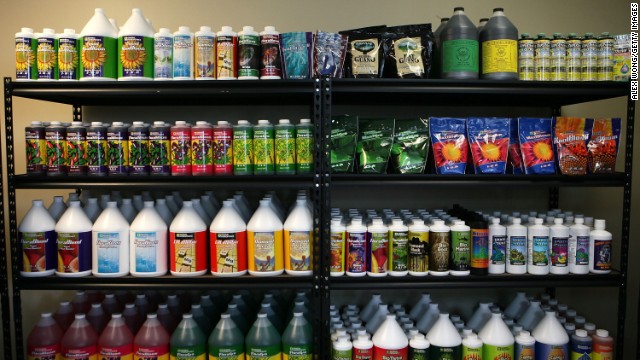 Nutrient products are placed on shelves in the weGrow marijuana cultivation supply store during its grand opening on March 30, 2012, in Washington, D.C. The store is a one-stop-shop for supplies and training to grow plants indoors, except for the actual marijuana plants or seeds. Legislation was enacted in 2010 authorizing the establishment of regulated medical marijuana dispensaries in the nation's capital.
Nutrient products are placed on shelves in the weGrow marijuana cultivation supply store during its grand opening on March 30, 2012, in Washington, D.C. The store is a one-stop-shop for supplies and training to grow plants indoors, except for the actual marijuana plants or seeds. Legislation was enacted in 2010 authorizing the establishment of regulated medical marijuana dispensaries in the nation's capital.  Marijuana activist Steve DeAngelo wears a "Yes on Prop 19" button as he speaks during a news conference in Oakland, California, on October 12, 2010, to bring attention to the state measure to legalize marijuana for recreational purposes in California. Voters rejected the proposal.
Marijuana activist Steve DeAngelo wears a "Yes on Prop 19" button as he speaks during a news conference in Oakland, California, on October 12, 2010, to bring attention to the state measure to legalize marijuana for recreational purposes in California. Voters rejected the proposal.  Sonja Gibbins walks through her growing warehouse in Fort Collins, Colorado, on April 19, 2010. Since the state approved medical marijuana in 2000, Colorado has seen a boom in marijuana dispensaries, trade shows and related businesses. So far 20 states and the District of Columbia have made smoking marijuana for medical purposes legal.
Sonja Gibbins walks through her growing warehouse in Fort Collins, Colorado, on April 19, 2010. Since the state approved medical marijuana in 2000, Colorado has seen a boom in marijuana dispensaries, trade shows and related businesses. So far 20 states and the District of Columbia have made smoking marijuana for medical purposes legal. 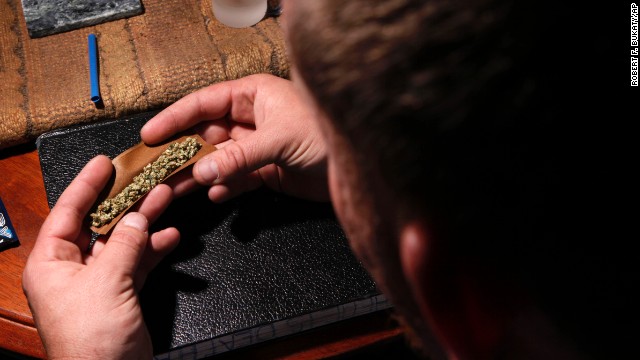 A patient prepares to smoke at home in Portland, Maine, on October 22, 2009, a decade after the state approved a medical marijuana referendum.
A patient prepares to smoke at home in Portland, Maine, on October 22, 2009, a decade after the state approved a medical marijuana referendum.  Coffeeshop Blue Sky worker Jon Sarro, left, shows a customer different strains of medical marijuana on July 22, 2009, in Oakland, California. Voters in the city approved a measure during a vote-by-mail special election for a new tax on sales of medicinal marijuana at cannabis dispensaries.
Coffeeshop Blue Sky worker Jon Sarro, left, shows a customer different strains of medical marijuana on July 22, 2009, in Oakland, California. Voters in the city approved a measure during a vote-by-mail special election for a new tax on sales of medicinal marijuana at cannabis dispensaries. 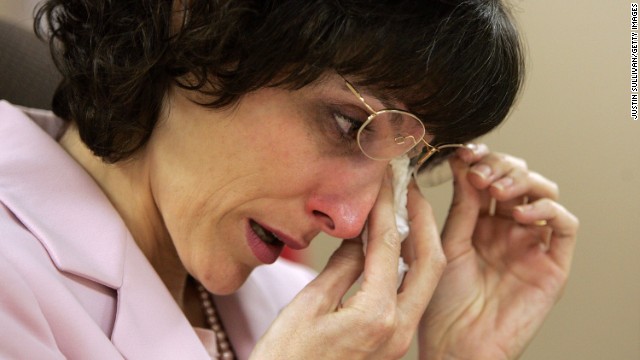 Medicinal marijuana patient Angel Raich wipes her eyes during a press conference on March 14, 2007, in Oakland, California. The 9th circuit U.S. Court of Appeals in San Francisco ruled that 41-year-old Raich, who used medicinal marijuana to curb pain from a brain tumor as well as other ailments, did not have the legal right to claim medical necessity to avoid the possibility of prosecution under federal drug laws.
Medicinal marijuana patient Angel Raich wipes her eyes during a press conference on March 14, 2007, in Oakland, California. The 9th circuit U.S. Court of Appeals in San Francisco ruled that 41-year-old Raich, who used medicinal marijuana to curb pain from a brain tumor as well as other ailments, did not have the legal right to claim medical necessity to avoid the possibility of prosecution under federal drug laws.  Different varieties of medical marijuana are seen at the Alternative Herbal Health Services cannabis dispensary in San Francisco on April 24, 2006. The Food and Drug Administration issued a controversial statement a week earlier rejecting the use of medical marijuana, declaring that there is no scientific evidence supporting use of the drug for medical treatment.
Different varieties of medical marijuana are seen at the Alternative Herbal Health Services cannabis dispensary in San Francisco on April 24, 2006. The Food and Drug Administration issued a controversial statement a week earlier rejecting the use of medical marijuana, declaring that there is no scientific evidence supporting use of the drug for medical treatment. 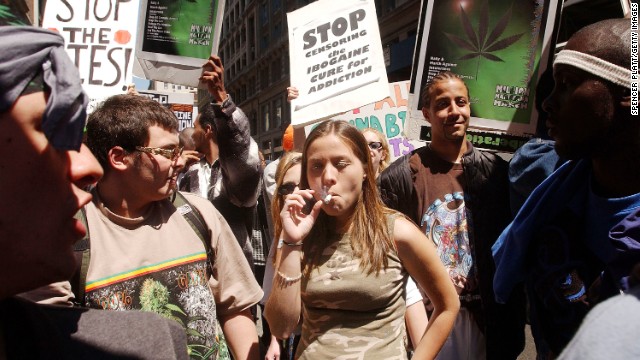 People in New York gather for a pro-cannabis rally on May 4, 2002. That same day, almost 200 similar events took place around the world to advocate for marijuana legalization. It was dubbed the "Million Marijuana March."
People in New York gather for a pro-cannabis rally on May 4, 2002. That same day, almost 200 similar events took place around the world to advocate for marijuana legalization. It was dubbed the "Million Marijuana March." 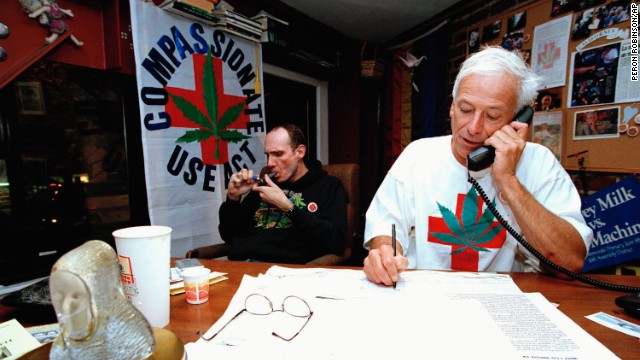 Dennis Peron takes notes during a phone interview while Gary Johnson lights up at the Proposition 215 headquarters in San Francisco on October 11, 1996. The ballot measure was approved when voters went to the polls in November, allowing medical marijuana in California.
Dennis Peron takes notes during a phone interview while Gary Johnson lights up at the Proposition 215 headquarters in San Francisco on October 11, 1996. The ballot measure was approved when voters went to the polls in November, allowing medical marijuana in California.  A television ad aired in 1996 by Republican presidential candidate Bob Dole's campaign included footage from a 1992 MTV interview of a laughing President Clinton saying he would inhale marijuana if given the chance to relive his college days.
A television ad aired in 1996 by Republican presidential candidate Bob Dole's campaign included footage from a 1992 MTV interview of a laughing President Clinton saying he would inhale marijuana if given the chance to relive his college days.  President George H. Bush holds up a copy of the National Drug Control Strategy during a meeting in the Oval Office on September 5, 1989. In a televised address to the nation, Bush asked Americans to join the war on drugs.
President George H. Bush holds up a copy of the National Drug Control Strategy during a meeting in the Oval Office on September 5, 1989. In a televised address to the nation, Bush asked Americans to join the war on drugs.  Robert Randall smokes marijuana that was prescribed to treat his glaucoma in 1988. He became the first legal medical marijuana patient in modern America after winning a landmark case in 1976.
Robert Randall smokes marijuana that was prescribed to treat his glaucoma in 1988. He became the first legal medical marijuana patient in modern America after winning a landmark case in 1976.  First lady Nancy Reagan participates in a drug education class at Island Park Elementary School on Mercer Island, Washington, on February 14, 1984. She later recalled, "A little girl raised her hand and said, 'Mrs. Reagan, what do you do if somebody offers you drugs?' And I said, 'Well, you just say no.' And there it was born." She became known for her involvement in the "Just Say No" campaign.
First lady Nancy Reagan participates in a drug education class at Island Park Elementary School on Mercer Island, Washington, on February 14, 1984. She later recalled, "A little girl raised her hand and said, 'Mrs. Reagan, what do you do if somebody offers you drugs?' And I said, 'Well, you just say no.' And there it was born." She became known for her involvement in the "Just Say No" campaign. 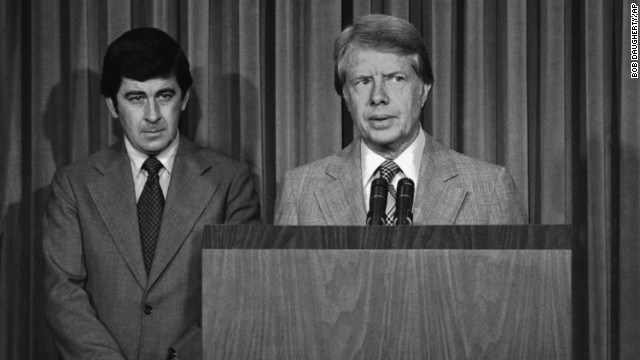 President Jimmy Carter, with his special assistant for health issues, Dr. Peter Bourne, beside him, talks to reporters at the White House about his drug abuse control message to Congress on August 2, 1977. Among other things, he called for the elimination of all federal criminal penalties for the possession of up to one ounce of marijuana.
President Jimmy Carter, with his special assistant for health issues, Dr. Peter Bourne, beside him, talks to reporters at the White House about his drug abuse control message to Congress on August 2, 1977. Among other things, he called for the elimination of all federal criminal penalties for the possession of up to one ounce of marijuana.  Panel members of the National Commission on Marijuana and Drug Abuse attend a hearing In Denver on January 10, 1972. From left, Dr. J. Thomas Ungerleider, psychiatrist; Michael R. Sonnenreich, commission executive director; Raymond P. Shafer, commission chairman; Mitchell Ware, Chicago attorney; Charles O. Galvin, Dallas law school dean. The commission's findings favored ending marijuana prohibition and adopting other methods to discourage use, but the Nixon administration refused to implement its recommendations.
Panel members of the National Commission on Marijuana and Drug Abuse attend a hearing In Denver on January 10, 1972. From left, Dr. J. Thomas Ungerleider, psychiatrist; Michael R. Sonnenreich, commission executive director; Raymond P. Shafer, commission chairman; Mitchell Ware, Chicago attorney; Charles O. Galvin, Dallas law school dean. The commission's findings favored ending marijuana prohibition and adopting other methods to discourage use, but the Nixon administration refused to implement its recommendations.  Protesters wade in the Reflecting Pool at the National Mall in Washington during the "Honor America Day Smoke-In" thrown by marijuana activists in response to the official "Honor America Day" rally organized by President Nixon supporters at the Lincoln Memorial on July 4, 1970.
Protesters wade in the Reflecting Pool at the National Mall in Washington during the "Honor America Day Smoke-In" thrown by marijuana activists in response to the official "Honor America Day" rally organized by President Nixon supporters at the Lincoln Memorial on July 4, 1970.  Marijuana reform was the Life magazine cover story in October 1969. The banner read: "At least 12 million Americans have now tried it. Are penalties too severe? Should it be legalized?"
Marijuana reform was the Life magazine cover story in October 1969. The banner read: "At least 12 million Americans have now tried it. Are penalties too severe? Should it be legalized?"  Police dogs trained to smell out hidden marijuana examine U.S. soldiers' luggage at the airport during the Vietnam War in 1969. Drug use was widespread during the war.
Police dogs trained to smell out hidden marijuana examine U.S. soldiers' luggage at the airport during the Vietnam War in 1969. Drug use was widespread during the war.  People share a joint during a 1969 concert in Portland, Oregon. In 1973, Oregon became the first state to decriminalize cannabis.
People share a joint during a 1969 concert in Portland, Oregon. In 1973, Oregon became the first state to decriminalize cannabis. 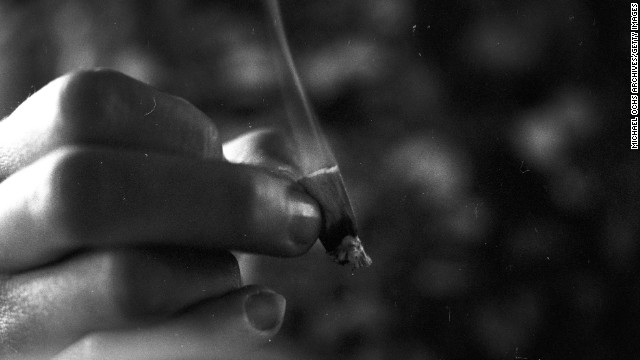 Marijuana use became more widespread in the 1960s, reflecting the rising counterculture movement.
Marijuana use became more widespread in the 1960s, reflecting the rising counterculture movement.  Research scientist Dr. Reese T. Jones, right, adjusts the electrodes monitoring a volunteer's brain response to sound during an experiment in 1969 that used a controlled dosage of marijuana. The tests were conducted at the Langley Porter Institute at the University of California, San Francisco.
Research scientist Dr. Reese T. Jones, right, adjusts the electrodes monitoring a volunteer's brain response to sound during an experiment in 1969 that used a controlled dosage of marijuana. The tests were conducted at the Langley Porter Institute at the University of California, San Francisco. 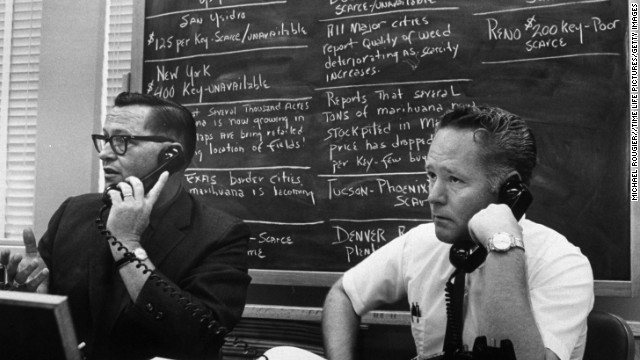 U.S. Customs agents track the nationwide marijuana market during Operation Intercept, an anti-drug measure announced by President Nixon in 1969. The initiative intended to keep Mexican marijuana from entering the United States.
U.S. Customs agents track the nationwide marijuana market during Operation Intercept, an anti-drug measure announced by President Nixon in 1969. The initiative intended to keep Mexican marijuana from entering the United States. 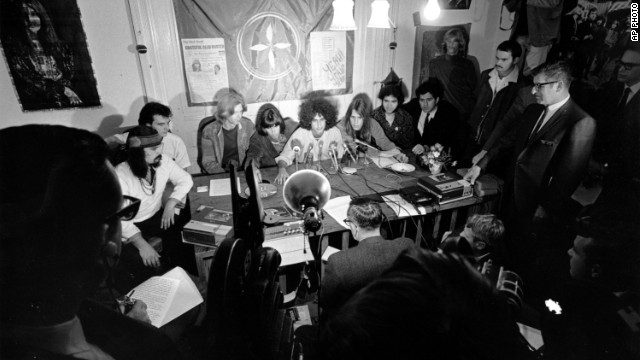 Members of the Grateful Dead talk with reporters from their home in San Francisco on October 5, 1967. The band was protesting being arrested for marijuana possession.
Members of the Grateful Dead talk with reporters from their home in San Francisco on October 5, 1967. The band was protesting being arrested for marijuana possession.  A woman buys ready-rolled marijuana cigarettes from a dealer at her door circa 1955.
A woman buys ready-rolled marijuana cigarettes from a dealer at her door circa 1955.  Even after Congress cracked down on marijuana in 1937, farmers were encouraged to grow the crop for rope, sails and parachutes during World War II. The "Hemp for Victory" film was released in 1942 by the U.S. Department of Agriculture.
Even after Congress cracked down on marijuana in 1937, farmers were encouraged to grow the crop for rope, sails and parachutes during World War II. The "Hemp for Victory" film was released in 1942 by the U.S. Department of Agriculture. 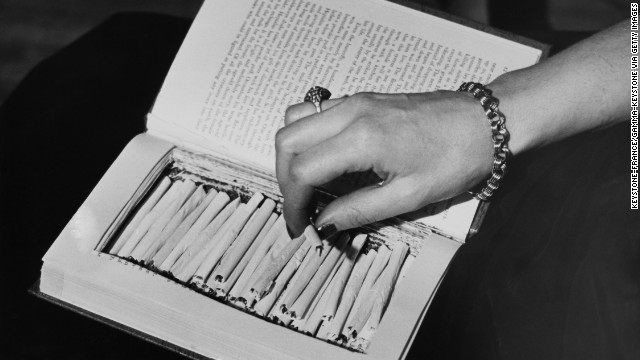 Marijuana cigarettes are hidden in a book circa 1940. Congress passed the Marijuana Tax Act in 1937, effectively criminalizing the drug.
Marijuana cigarettes are hidden in a book circa 1940. Congress passed the Marijuana Tax Act in 1937, effectively criminalizing the drug.  A poster advertises the 1936 scare film "Reefer Madness," which described marijuana as a "violent narcotic" that first renders "sudden, violent, uncontrollable laughter" on its users before "dangerous hallucinations" and then "acts of shocking violence ... ending often in incurable insanity."
A poster advertises the 1936 scare film "Reefer Madness," which described marijuana as a "violent narcotic" that first renders "sudden, violent, uncontrollable laughter" on its users before "dangerous hallucinations" and then "acts of shocking violence ... ending often in incurable insanity." 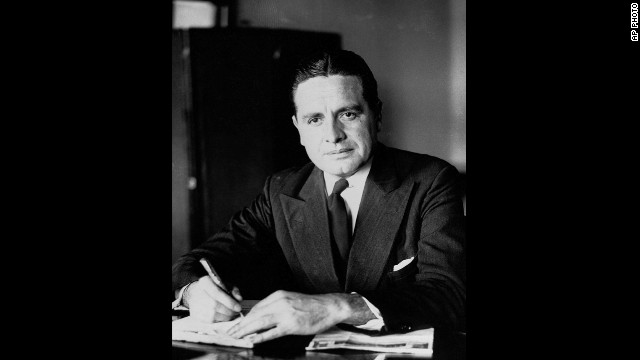 Harry Anslinger was named commissioner of the Federal Bureau of Narcotics when it was established in 1930. While arguing for marijuana prohibition, he played on Americans' fear of crime and foreigners. He spun tales of people driven to insanity or murder after ingesting the drug and spoke of the 2 to 3 tons of grass being produced in Mexico. "This, the Mexicans make into cigarettes, which they sell at two for 25 cents, mostly to white high school students," Anslinger told Congress.
Harry Anslinger was named commissioner of the Federal Bureau of Narcotics when it was established in 1930. While arguing for marijuana prohibition, he played on Americans' fear of crime and foreigners. He spun tales of people driven to insanity or murder after ingesting the drug and spoke of the 2 to 3 tons of grass being produced in Mexico. "This, the Mexicans make into cigarettes, which they sell at two for 25 cents, mostly to white high school students," Anslinger told Congress.
- The congressional spending bill blocks Washington, DC lawmakers from implementing marijuana legalization
- D.C. marijuana activists' worst fears were realized on Tuesday night with the agreed upon language
- Congress, under the district's Home Rule charter, is able to veto every law approved by either DC voters or government
- "This House language sucks," said Adam Eidinger, chair of the DC Cannabis Campaign
Washington (CNN) -- The congressional spending bill agreed to on Tuesday night blocks Washington, DC lawmakers from using federal or local funds to implement November's popularly passed referendum to legalize marijuana in the district.
The legislation, according to a release from Republican Rep. Hal Rogers, chairman of the House Appropriations Committee, "prohibits both federal and local funds from being used to implement a referendum legalizing recreational marijuana use in the district."
The language in the bill -- found on page 660 of the 1,603 page document -- is word-for-word what Republican Rep. Andy Harris of Maryland proposed earlier in the year.
"None of the funds contained in this act may be used to enact or carry out any law, rule or regulation to legalize or otherwise reduce penalties associated with the possession, use, or distribution of any schedule I substance under the Controlled Substances Act or any tetrhydrocannabinols derivative for recreational purposes," reads the bill.
DC marijuana activists' worst fears were realized on Tuesday night with the agreed upon language. Earlier in the day, activists worried that Congress would thwart November's popular vote to legalize pot in the district.
"This House language sucks," Adam Eidinger, chair of the DC Cannabis Campaign, said after the language was released. "Only the Senate can step up and do something or presidential veto. Otherwise our election has just been overturned and we will take it to the streets."
In response to the Congress' decision, pro-marijuana groups are prepared to protest Wednesday night.
Although the proposal needs to pass the House and Senate and get signed into law by the President, it appears unlikely the Democrats will risk shutting down the government to remove the marijuana language.
Senate Majority Leader Harry Reid, who believes that DC should be able to do what it wants, admitted to reporters earlier today that "if they put it in there, it's going to be hard to take it out."
And in announcing the deal, Rep. Nita Lowey, D-New York, said that although she "strongly oppose[s] several policy riders included in this final agreement ... I am pleased Democrats were able to eliminate many of the most damaging provisions."
By moving to stop legalization efforts in DC, Congress will have trumped the over 70 percent of district residents who voted to legalize marijuana in November.
Congress, under DC's Home Rule charter, is able to veto every law approved by either DC voters or government. In the past, this power has been used to block everything from abortion spending to needle exchange.
During the 2011 budget negotiations, President Barack Obama reportedly used the district's law of paying for low-income women's abortions as a bargaining chip with House Speaker John Boehner.
"John, I will give you DC abortion. I am not happy about it," Obama said, according to The Washington Post.
 This is your body on weed
This is your body on weed  Can states afford NOT to legalize pot?
Can states afford NOT to legalize pot?  Exclusive: Obama talks about pot
Exclusive: Obama talks about pot "This was always a possibility but I think it is very, very disturbing that Democrats have given this away," said Michael Collins, policy manager for the Drug Policy Alliance, a group that lobbied for the DC law. "This is really one of the final acts of Democratic leadership before Republicans control both sides and for them to give this away, it just seems to very tone deaf."
The DC Cannabis Campaign, the group who introduced and passed the legalization ballot initiative, also blamed congressional Democrats for blocking the legislation.
"This is a big issue and if you are going to overturn an election, you are going to demoralize young Democrats across the country," said Eidinger said.
DC Mayor-elect Muriel Bowser has not yet commented on the possibility of Congress addressing the district's marijuana law. But her spokesman, Joaquin McPeek, before the language came out on Tuesday that Bowser "would hope that Congress would respect the will of the voters and reject any challenge to their rights."
With Congress blocking marijuana funding, expect many DC residents to cry foul about what they calling living under the thump of Congress.
"This is nothing new," said Mark Plotkin, a longtime figure in DC politics. "We are a colony. We are America's colony and anytime they want to screw around with us, they can do such things."
What's more, while Congress is making decisions for the district, proponents of district autonomy were quick to point out that district residents still have no voting member of the House or Senate.
This story has been updated to include additional information
No comments:
Post a Comment